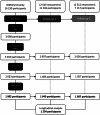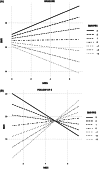Mediterranean diet and obesity polygenic risk interaction on adiposity in European children: The IDEFICS/I.Family Study
- PMID: 40384423
- PMCID: PMC12234417
- DOI: 10.1111/ijpo.70023
Mediterranean diet and obesity polygenic risk interaction on adiposity in European children: The IDEFICS/I.Family Study
Abstract
Background and objectives: To examine whether changes in the Mediterranean Diet (MD) or any of its MD food groups modulate the genetic susceptibility to obesity in European youth, both in cross-sectional and longitudinal analyses.
Methods: For cross-sectional analysis, 1982 participants at baseline, 1649 in follow-up 1 (FU1) and 1907 in follow-up 2 (FU2), aged 2-16 years of the IDEFICS/I.Family studies were considered. For the longitudinal design, 1254 participants were included. Adherence to MD was assessed using the Mediterranean Diet Score (MDS), and genetic susceptibility to high BMI was assessed with a polygenic risk score (BMI-PRS). Multiple linear regression models were fitted to estimate gene × MD effects on markers of obesity.
Results: In cross-sectional analyses, at baseline, higher MDS was associated with higher BMI in children with high genetic susceptibility (β = 0.12; 95% CI = [0.01, 0.24]). However, 6 years later, at FU2, higher MDS was associated with lower BMI (β = -0.19; 95% CI = [-0.38, -0.01]) in children with high genetic susceptibility, showing an attenuating MDS effect. Also in FU2, vegetables and legumes (V&L) showed inverse associations with BMI (β = -0.01; CI = [-0.02, -0.00]) and WC (β = -0.02; CI = [-0.03, -0.00]) regardless of the obesity genetic risk, although the effect sizes were small. In the longitudinal analyses, no MDS-obesity associations or gene × diet interaction effects were observed.
Conclusions: In cross-sectional analysis (baseline and FU2), the MD modulated the association between obesity susceptibility and adiposity indicators in European youth, having an exacerbating effect in children measured during infancy years and an attenuating effect in early adolescent years.
Keywords: BMI; children; gene × diet; mediterranean diet; polygenic risk score.
© 2025 The Author(s). Pediatric Obesity published by John Wiley & Sons Ltd on behalf of World Obesity Federation.
Conflict of interest statement
No conflict of interest was declared.
Figures


References
-
- Abarca‐Gomez L, Abdeen Z, H ZA, et al. Worldwide trends in body‐mass index, underweight, overweight, and obesity from 1975 to 2016: a pooled analysis of 2416 population‐based measurement studies in 128·9 million children, adolescents, and adults. Lancet (London, Engl). 2017;390(10113):2627‐2642. doi: 10.1016/S0140-6736(17)32129-3 - DOI - PMC - PubMed
-
- Labayen Goñi I, Arenaza L, Medrano M, García N, Cadenas‐Sanchez C, Ortega F. Associations between the adherence to the Mediterranean diet and cardiorespiratory fitness with total and central obesity in preschool children: the PREFIT project. Eur J Nutr. 2018;57(8):2975‐2983. doi: 10.1007/s00394-017-1571-3 - DOI - PubMed
MeSH terms
Grants and funding
LinkOut - more resources
Full Text Sources
Medical
Research Materials
Miscellaneous

